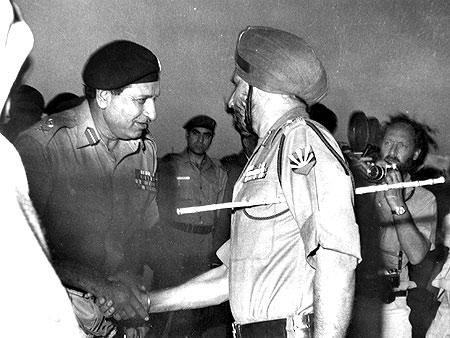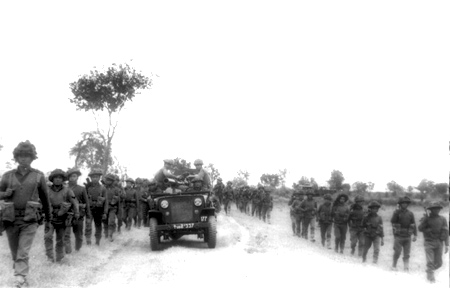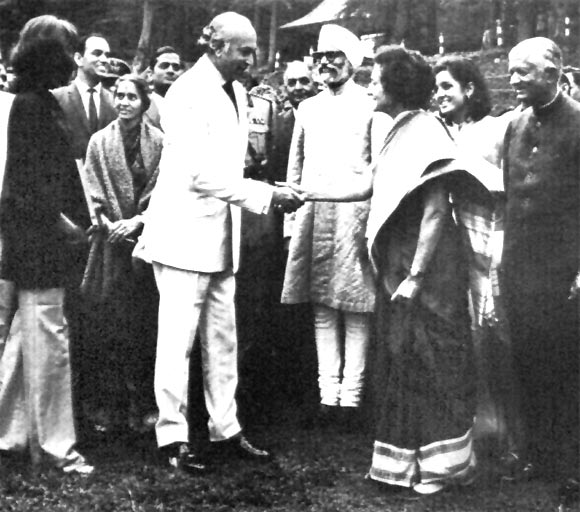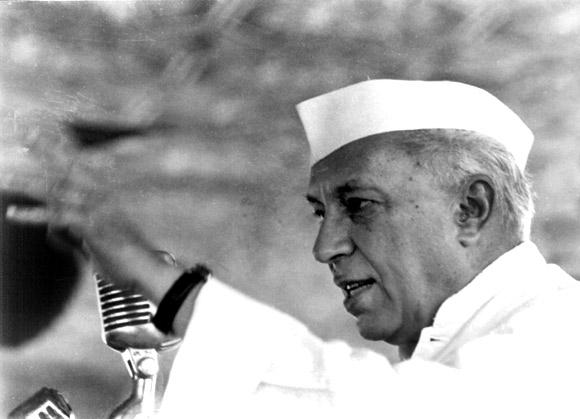 | « Back to article | Print this article |
Three Indian blunders in the 1971 war
Pakistan army officers got away without being tried for genocide in 1971: Colonel Anil Athale (retd) identifies India's three blunders in that war.
The 1971 Indo-Pak war was one of those rarest of rare occasions in our history when India took the military initiative.
Politically, the war began in April 1971 when Pakistan pushed nearly nine million refugees into India through a campaign of rape, murder and terror that statistically comes close to Hitler's genocide of Jews in the Second World War, in scale and brutality.
Military force remained the only option when it became clear that the rest of the world had decided to ignore this crime. India bided its time till the winter snows closed the Himalayan passes, rendering Chinese intervention difficult.
Around November 26, 1971, India began to nibble at East Pakistani territory. Pakistan, instead of cutting its losses and calling quits, in a desperate gamble escalated the conflict by launching air/ground attacks in the West on December 3, 1971. By escalation, it hoped to rope in China and the US in widening the conflict and hoped for a UN intervention a la Kashmir.
The Indian Air Force achieved remarkable success when within the first 48 hours it achieved complete air superiority in the Eastern theatre of war. This enabled the advancing army columns to move without any fear of detection even in daytime.
With supply from the air assured, the army did not have to be dependent on opening of roads, which were heavily defended by the Pakistanis. The five division-strong Indian forces advanced from three directions and secured choke points well in the rear.
The bypassed Pak forces had no option but to up stick and attack the Indian troops in order to go back to Dhaka. This was a classic case of 'offensive strategy' and defensive tactics devised by the indomitable General J F R Jacob.
These tactics were reminiscent of the Israeli tactics of 1967 war when they bypassed the Egyptian forces in front and seized the passes in the rear (the Mitla and Giddi passes in the Sinai mountains).
The Indian Army in Bangladesh similarly bypassed the Pakistani forces on the border and headed for the river ferries/crossings/bridges in the rear. This war strategy took advantage of the fact of modern warfare that tactically 'defence' is always stronger than offence.
The Eastern prong led by Lieutenant General Sagat Singh found a chance opening and exploited it. In 24 hours, 12 small helicopters of the air force ferried brigade strength across a mile wide Meghan river.
The Pakistani defenders were totally taken aback and Indian troops reached Dhaka by December 13-14. The navy had blockaded the sea and All India Radio constantly drummed into the Pak soldiers that they had no choice but to surrender.
Surrender by the 93,000 strong garrison was only a matter of time.
It is interesting to note that the Indian troops had less than 1:2 superiority and were on the offensive. Normally that means more casualties. But it is tribute to Indian general-ship that the Indian loss was 2,000 men as against that of Pak at 6,000.
Credit for this goes to the dash and efficiency of the three services. The Bangladesh attack has been compared by many to the famous Blitzkrieg of the Germans. It must be never forgotten that the military success was a joint Indo-Bangladeshi effort.
Without the whole-hearted support from the Bangladeshis, this war could have never been won. The people of Bangladesh paid a very heavy price for their freedom.
Please click NEXT to read further...
Kashmir was not an issue at all in the 1971 war
In the West, both sides played a waiting game. In northern Kashmir, in the dead of winter, the Indian Army that was better trained and equipped, captured large amount of territory. There were minor losses in Chhamb and in Punjab.
India captured the Shakargarh tehsil in Punjab and many jump-off points on the western front. When the cease fire came on December 17, India had shifted many troops from the East to West and was in a military position to over-run West Pakistan as well.
The move of USS Enterprise and American threats of retaliation as well as Russian caution possibly saved Pakistan. An abortive Pakistani attempt to break through in Rajasthan at Longewala was foiled by a dogged infantry and the Indian Air Force that came to the army's rescue.
The navy in the course of the war sunk the Pakistani Ghazi submarine and also raided Karachi harbour. The air force carried out limited attacks only on military targets.
All in all, the 1971 war was a comprehensive victory for India and Bangladesh.
India's three strategic blunders:
In 1971 India lost a golden opportunity to sever the Sino-Pak communications by land and threaten the Karakoram highway.
In the 1971 war, all attention was focussed on the Eastern front. The Indian successes in Punjab, Shakargad, Chicken's Neck near Akhnoor, the thrust towards Naya Chor in the deserts were substantial. We also lost Chhamb in Jammu and Kashmir and small areas in the Fazilka sector.
The rest of the Cease Fire Line (as it was then called) was quiet with the exception of some 'local' initiatives in Ladakh, largely due to the valiant efforts of the great Colonel Rinchon and his Ladakh Scouts.
Kashmir was not an issue at all in that war.
Later at the Simla Peace Conference, India brought in the Kashmir issue. The conversion of the Cease Fire Line (agreed as per the Karachi agreement of 1949) was converted to the LOC or Line of Control, a sort of half-way house between the Cease Fire Line and the international border.
Though not marked on the ground, it is marked on the map in great detail after a ground survey. But at the conference in Simla, it was also agreed to let each side retain the territory captured by each other in Jammu and Kashmir.
In spite of extensive study of all the official documents connected with this war (including the minutes of the meeting of the Cabinet Committee on Political Affairs, the top decision-making body in the country at the time), there is no hint that this was a considered policy of the government of India before the war and that the armed forces were aware of it.
In the 1971 war in Kashmir, Pakistan gained some territory in Chhamb as the Indian Army poised for an offensive was caught off guard by the Pakistani attack. A determined Pakistani attack against the city of Poonch was thwarted by superior Indian strength.
India captured strategic outposts in the Kargil area, posts that dominated the Srinagar-Ladakh road link and was a constant irritant. In a war fought at the height of winter, the better-trained and equipped Indian mountain troops also captured vast areas north of Leh in the Partapur and Turtuk sector.
Please click NEXT to read further...
The recognition India gave the 'Kashmir dispute' in the Simla Agreement was a blunder
If India had plans to retain the captured territory in Jammu and Kashmir a major thrust towards Skardu or Gilgit could have threatened the land access between Pakistan and China.
Unlike in 1965 when the Chinese served an ultimatum, in 1971 the Soviet build-up on the Sino-Soviet border on the Amur river border (of almost 44 divisions from the normal 3 or 4) kept China out of this conflict. An opportunity that is unlikely to present itself in the future.
As India faces a Sino-Pak joint military threat in the north, one can only wonder the effect this blunder has had. It is difficult to blame the military leadership for this as in retrospect it appears that the decision to retain gains in Kashmir was a 'spur of the moment after thought.'
It is amazing to note the cavalier manner in which issues of war and peace continue to be dealt in independent India.
The second blunder was the explicit recognition that India gave to the 'Kashmir dispute' in the Simla Agreement.
Zulfikar Ali Bhutto came to Simla as the head of a defeated nation with nothing to bargain. 93,000 Pakistani prisoners were in India and the tehsil of Shakargarh as well as large tracts of desert were under Indian occupation.
The Pakistani State itself was tottering and the only card Bhutto had was to play on the Indian need to have a viable Pakistan survive. Using his weakness dexterously, Bhutto made sure that India could never drive a hard bargain.
All that Pakistan conceded at Simla was that it would not use force to solve the Kashmir problem and it would deal with the issue bilaterally. It is indeed astonishing that a militarily weak and defeated nation promising 'non use of force' against another country ten times its size, being seen as a concession.
This naivete was to cause immense difficulties in the future. The acceptance of the disputed status of Kashmir was a major diplomatic blunder and India continues to pay a heavy price for it. In the words of a sports commentator, India snatched diplomatic defeat from the jaws of victory.
Please click NEXT to read further...
The 'Ashoka Syndrome' of the Indian leadership
Pandit Nehru was the original Ashoka of modern times. Out of all the historical period great rulers of India, that include Chandragupta, Samudragupa or Vikramaditya, Ashoka seems to fascinate all.
From Nehru to Vajpayee and now Manmohan Singh, all want to emulate the great emperor and usher in peace. Even a supreme realist and tough leader like Indira Gandhi succumbed to this temptation at Simla in 1972.
Indians have forgotten that Ashoka embarked upon his 'peace offensive' only after the Kalinga victory. 1971 was a decisive victory only in the East, and the Pakistan army remained largely undefeated in the West.
Indians do not still realise that international agreements are honoured for either of the two reasons -- The agreement gives some tangible benefit to the countries involved or breaking of the agreement can mean loss for the violator.
The Simla Agreement was honoured by Pakistan till such time as the Indian troops did not vacate captured territory and the Pakistani prisoners did not return. Once these two short-term objectives were achieved, Pakistan found no reason to go on to implement the next step -- normalisation of relations.
Improvement in relations and people-to-people contacts were never permitted by Pakistan and the hoped for atmosphere to tackle the Kashmir issue never built up.
Today after violating all the other clauses of the Simla Agreement, Pakistan now harps on Article 6 that had provided for Indo-Pak talks at head of the government level to solve the Kashmir issue.
This is sheer sophistry, but effective diplomacy and the Indian diplomats have been stumped.
But the greatest blunder was to let the Pakistani army get away with its 'genocide' in Bangladesh.
There is massive evidence of Pakistani army brutality in Bangladesh. The evidence is from Pakistani sources itself, the Justice Hamidur Rehman Commission Report. Some of the testimony in that report makes very chilling reading, even 40 years after the event.
There is a mountain of evidence about Pakistani army atrocities. What did the Government of India do? We banned the short film made by S Sukhdeo, Nine Months to Freedom at Bhutto's request. The Pakistani army selectively targeted Hindus, members of the Awami League and Bangladesh intellectuals. It was a well known secret that the bulk of the refugees (close to 70 per cent) were Hindus.
Rumour has it that even the much maligned right wing organisation in India kept quiet on this issue so that communal peace in India should not be disturbed. The playing down of Pakistani genocide let a Rogue Army escape the consequences of its misbehaviour.
India only stored trouble for the future. The Nazis were tried for massacring the Jews, the Khmer Rouge, Saddam Hussein, Serbian militants, all faced international courts -- only the Pakistani army got away with murder, rape and loot.
While Bangladesh attempts to get justice for the victims, India is silent.
Colonel Dr Anil Athale (retd) is a former head of the War Studies Division, ministry of defence. He is currently the coordinator of Inpad, a Pune-based think-tank.



